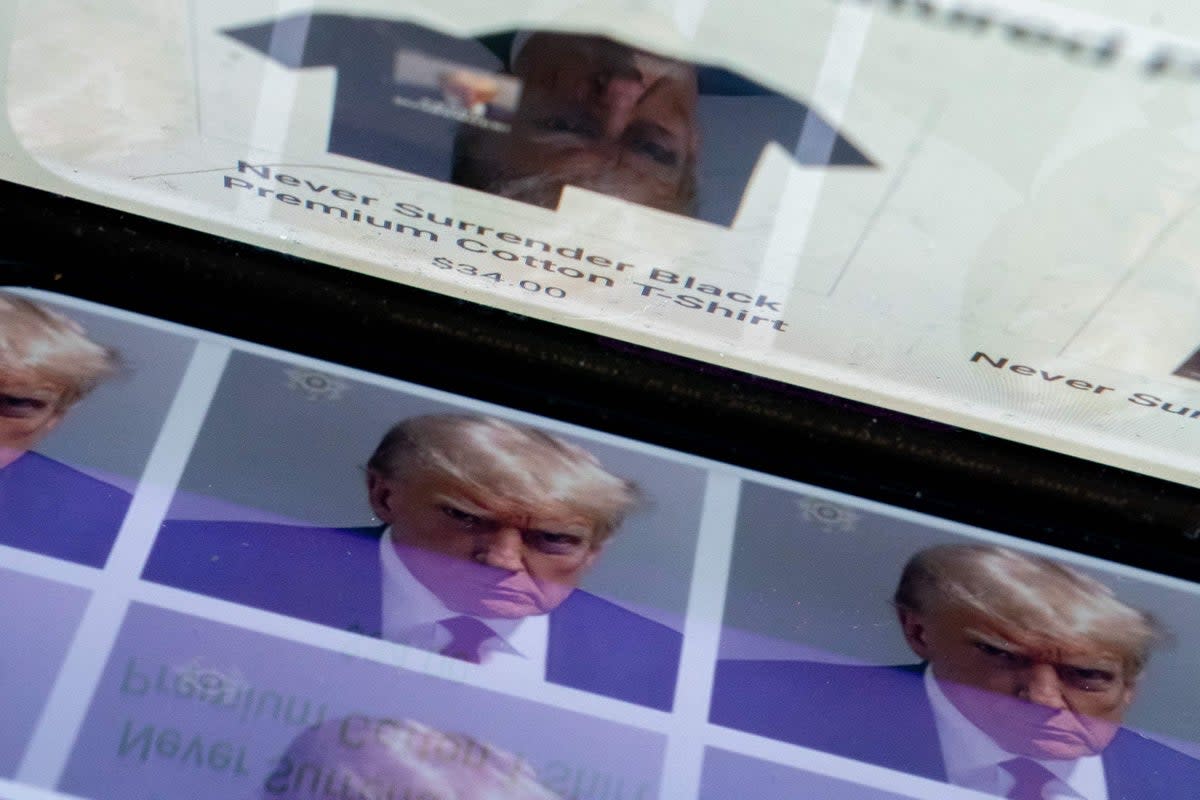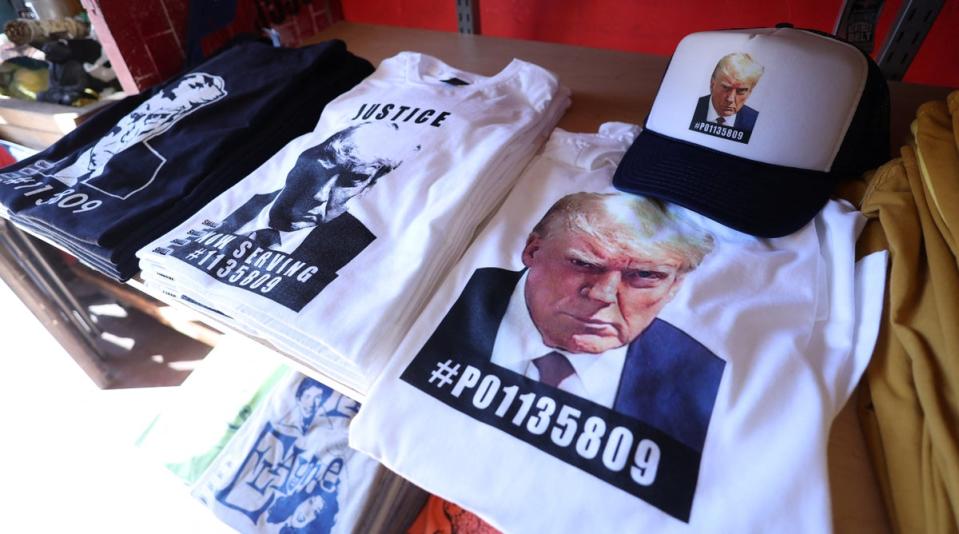Trump has raised millions with his mug shot. Legal experts say it could be a big mistake

Moments after his mug shot was publicly released, Donald Trump’s campaign sent out a fundraising email from the “Official Trump Store” with the image on a T-shirt.
The next day, his campaign offered supporters a “limited edition” mug shot poster signed by the former president. The campaign sent at least 15 emails between 25 August and 4 September promoting the mugshot or the T-shirt – including a video in which the nation’s 45th president boasts that the campaign raised “$10m” from the image, taken from Fulton County jail in Georgia after he was booked on a range of crimes connected to his attempts to overturn the results of the 2020 presidential election.
In the video, he holds up a shirt and tells his supporters: “If you want to go out and get it, you can go out and get it. Have fun with it.”
The historic image has also exploded online as his opponents and critics use the image to ridicule Mr Trump, from Etsy retailers to the anti-Trump Lincoln Project and the band Green Day, which replaced its album art from the 1997 album Nimrod with Mr Trump’s face to support Greater Good Music and Hawaii wildfires recovery efforts.
But rather than feeling an ounce of shame one typically would expect comes along with posing for a booking photo, particularly as the first former president to face criminal prosecution let alone charges in four jurisdictions, including alleged crimes committed while in office, the former president has weaponized the image to his campaign’s benefit.
Instead, as Rutgers University-Camden professor and Crap: A History of Cheap Stuff in America author Wendy A Woloson told The New York Times, the commodification of the image “shows the cynicism of late capitalism and the era we are in”. The shot – a defining image capturing a fragile moment for American democracy – has been reduced to a souvenir.
And the campaign is well aware of its value. One of his advisers even threatened other campaigns using the mug shot without Mr Trump’s permission. “WE ARE COMING AFTER YOU,” Chris LaCivita wrote the day after its release.
Within the first day after the image was made public, Mr Trump’s campaign reportedly raised more than $4m, “the highest grossing day of the entire campaign,” according to adviser Steven Cheung.
But those millions, and the millions more that have rolled in, might belong to Fulton County.
Guy A Rub, a copyright law professor at Ohio State University Moritz College of Law, says that the former president could face legal consequences for using the mug shot without the express authorisation from authorities to do so.
“The copyright in the shot obviously does not belong to Trump. Generally, copyright belongs to whoever took the picture of its organisation. In this case, it is probably the sheriff’s office or the state,” Mr Rub told The Independent.

Federal law does not allow the federal government to own a copyright for booking photos, effectively leaving them to the public domain. But that is not necessarily the case at the state and local level, where using such images can be subject to fair use limitations.
“If the Sheriff’s office (or the state) wants to enforce the copyright in the image, it can probably do it,” Mr Rub added. “Copyright infringement can entail various sanctions, including the profits that the infringer, meaning the Trump campaign, gained as a result of the infringement.”
A 2022 article from the University of Georgia School of Law’s Journal of Intellectual Property Law notes that “the author of the [mug shot] photograph is the law enforcement agency.”
Betsy Rosenblatt, a professor at Case Western Reserve University’s School of Law, told Spectrum News that people are generally prohibited from using a mug shot and “reproducing it, making a derivative work of it, distributing it without authorisation, or that is to say distributing anything that isn’t the one copy you already lawfully have, and various other things.”
While the sheriff’s office did take the image and make it publicly available, it does not necessarily mean that Mr Trump’s campaign – or other sellers – have the right to distribute it for a profit, without permission.
The sheriff’s office could believe that the image is a public document and would rather avoid hiring counsel and pursuing costly litigation, including tracking down and mailing out take-down notices and cease-and-desist letters to the campaign and other sellers, Ms Rosenblatt explained.
Public access to jail records and booking photos are, like many things in America, subject to patchwork laws that differ between states. Laws governing the publication and removal of mug shots from public view have been enacted in several states, while other state and local jurisdictions make them freely available in online jail records. Booking and inmate information – including Mr Trump’s – is freely available on the Fulton County Sheriff’s Office website.
There are “no easy answers” when it comes to determining fair-use applications for such images, Ms Rosenblatt said.
The former president has waived his arraignment appearance and pleaded not guilty to 13 charges against him in Georgia, where a sweeping racketeering indictment has accused him and 18 of his allies-turned-co-defendants of a criminal enterprise to unlawfully reject election results in the state.
The charges encompass 40 separate crimes and 161 different acts connected to the alleged criminal conspiracy.
It is one of four criminal cases against him, including a separate federal indictment surrounding the 2020 election and efforts to undermine the outcome; a federal case alleging his illegal retention of classified documents at his Mar-a-Lago home; and a state criminal case in New York accusing Mr Trump of falsifying business records to scrub potentially damaging stories of his affairs leading up to the 2016 election. He has pleaded not guilty in all cases.


